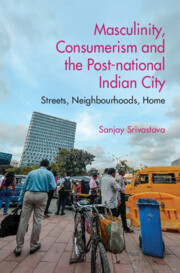Book contents
- Frontmatter
- Dedication
- Contents
- List of Figures
- Acknowledgements
- 1 Introduction: Masculinity, Modernity, Urbanity
- 2 Nationalism, Masculinity and the City
- 3 Dislocated Masculinities and the Unofficial City
- 4 Thrilling Affects: Sexuality, Masculinity, the City and ‘Indian Traditions’ in the Contemporary Hindi ‘Detective’ Novel
- 5 Fragmentary Pleasures: Masculinity, Urban Spaces and the Commodity Politics of ‘Religious Fundamentalists’
- 6 Technotopias: Masculinity, Women, the City and the Post-national Condition
- 7 Conclusion: Masculine Body Politics
- Bibliography
- Index
3 - Dislocated Masculinities and the Unofficial City
Published online by Cambridge University Press: 06 September 2022
- Frontmatter
- Dedication
- Contents
- List of Figures
- Acknowledgements
- 1 Introduction: Masculinity, Modernity, Urbanity
- 2 Nationalism, Masculinity and the City
- 3 Dislocated Masculinities and the Unofficial City
- 4 Thrilling Affects: Sexuality, Masculinity, the City and ‘Indian Traditions’ in the Contemporary Hindi ‘Detective’ Novel
- 5 Fragmentary Pleasures: Masculinity, Urban Spaces and the Commodity Politics of ‘Religious Fundamentalists’
- 6 Technotopias: Masculinity, Women, the City and the Post-national Condition
- 7 Conclusion: Masculine Body Politics
- Bibliography
- Index
Summary
Introduction
The elite metropolitanism identified in the previous chapter was intended to be part of a redemptive strategy of elite nationalism. City life was to be the template for civilised values and an antidote for curing a variety of social and cultural ills. Within this discourse, however, there was no attempt to explore what makes a city what it is; its asymmetries and the ways in which those who occupy its margins negotiate uneven social and economic terrains did not interest the advocates of elite metropolitanism. What was being imagined was urban life without the experiences of urban living.
Urban modernity in India is, however, the product of contests between formalised visions of an idealised urban civility and tangible lifeways enmeshed in the informality of governance, residence, livelihoods and life choices. Elite visions of the city – and national life as city life – invariably become mired in the quotidian and improvised (Simone 2019) politics of ‘the street and the ward level as critical spaces in which the poor barter for access’ (Weinstein, Sami and Shatkin 2014: 40) to resources for material well-being as well as a life of the imagination. I turn in this chapter to streets and footpaths and a variety of other spaces of informality to bring to view those relationships between the city and masculinity that tell us something about both subalternity and desires for worlds beyond it. The chapter also initiates a discussion on the post-national condition. This overarching framework ties together explorations of urban spaces as crucibles of masculine desires, aspirations and anxieties as the latter engage with multiple social and economic structures such as class, caste, religious belief and the politics of domesticity.
This chapter focuses on urban cultures of masculinity and sexuality that provide insights into the anxieties of masculine immigrant life in the metropolis. Its subjects are the precarious subjects of the city who, in early 2020, expressed their precarity through desperate attempts to leave the city in the wake of the COVID-19 epidemic; they are in the city though their claims as full residents are rarely recognised. They are both essential to its economy and marginal to its culture.
- Type
- Chapter
- Information
- Masculinity, Consumerism and the Post-National Indian CityStreets, Neighbourhoods, Home, pp. 60 - 81Publisher: Cambridge University PressPrint publication year: 2023



